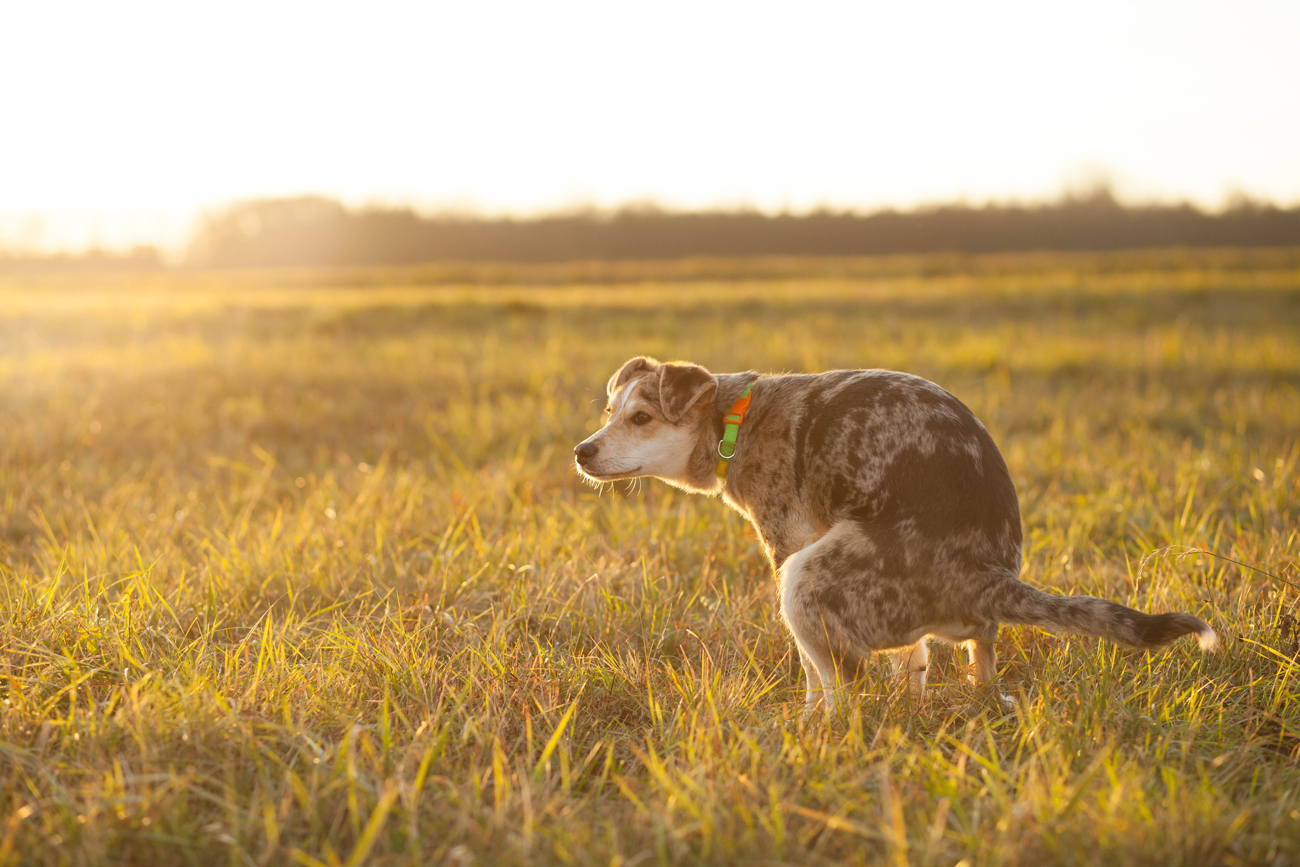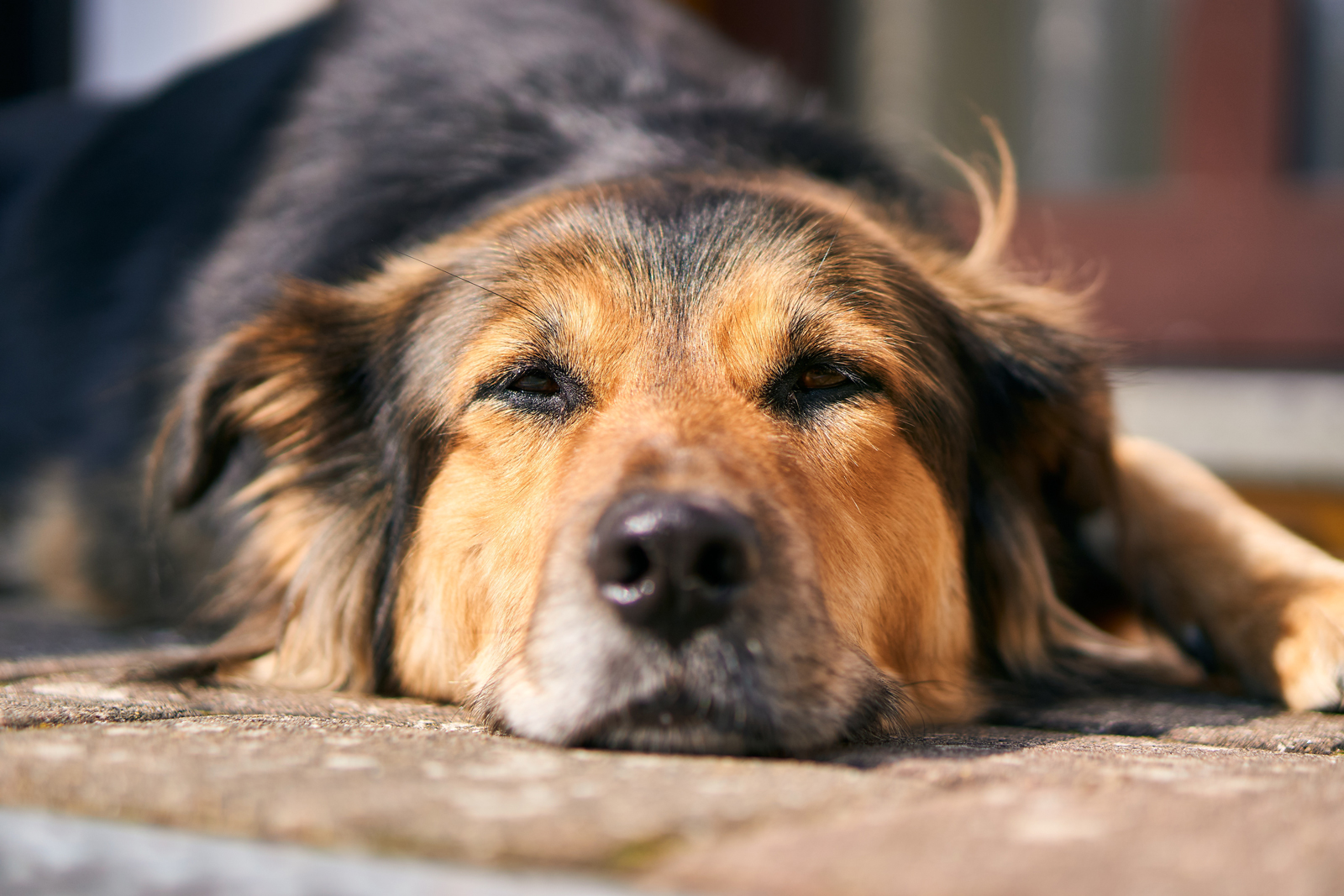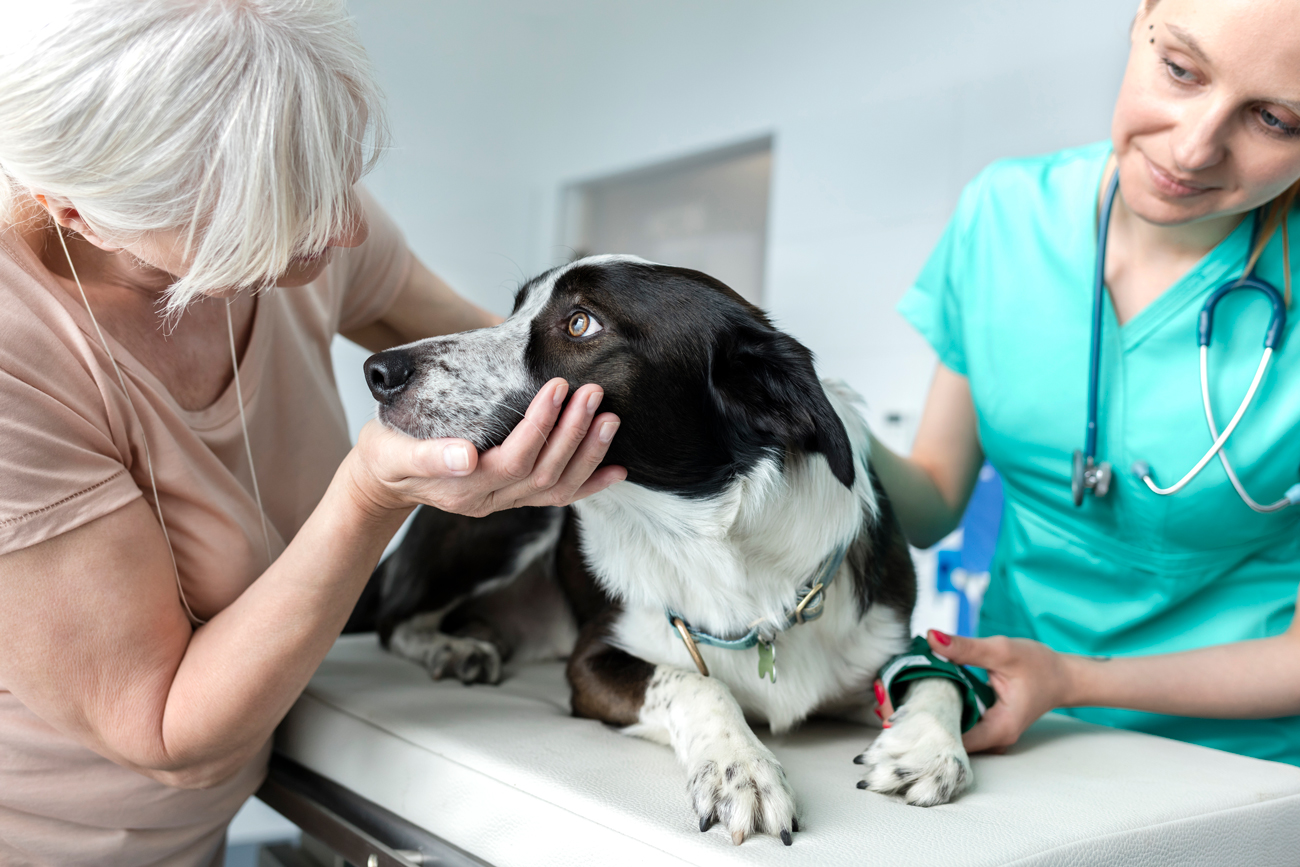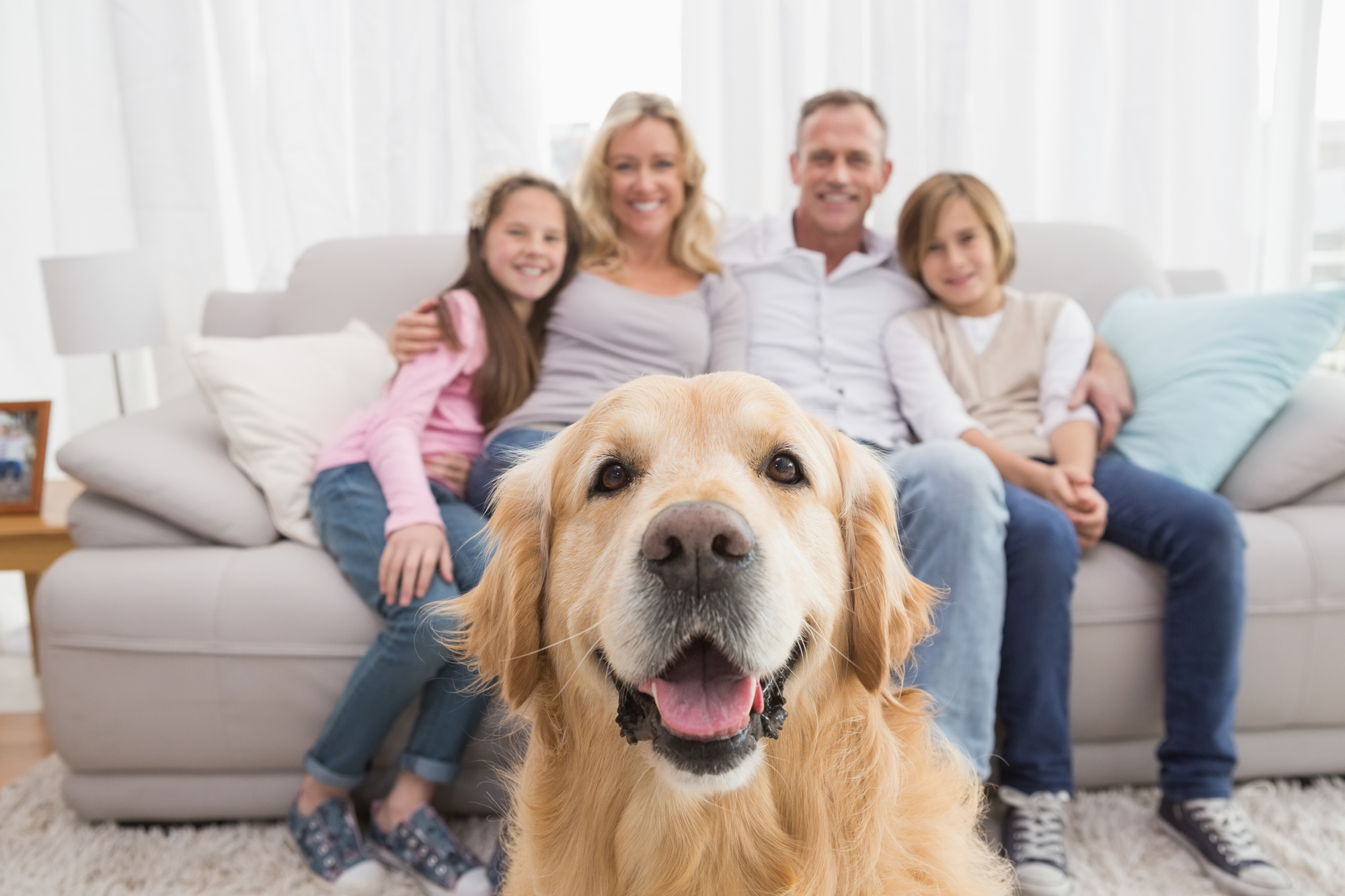
How to cope with older dog incontinence
12th May, 2021
Dogs bring so much joy into our lives. From boisterous puppies to faithful old-timers the loyalty and affection they show their families creates unbreakable bonds. Unfortunately, all stages of a dog’s life will bring particular challenges in terms of health problems, injuries and illnesses.
One of the problems that tends to affect older dogs is bladder and/or bowel incontinence. This upsetting condition can make life difficult for both canines and their owners. After all, no dog wants to make an unpleasant mess in their own home.
If your dog begins to show signs of incontinence then don’t despair. There are plenty of ways to cope with the issue of elderly dog incontinence. First off, read our helpful guide. From what signs to look out for, its causes and how to treat incontinence, we’ve got answers to all your doggy dilemmas.
Hopefully this article will help, but if you need further assistance then it might be time to call in a veterinary professional. If you’ve got insurance for an older dog in place with Petwise you’ll be able to call the 24-Hour Vet Helpline for advice.
What is incontinence?
When a dog is suffering from incontinence, it means they are unable to fully control their bladder and/or their bowel movements.
Whether they are asleep, resting or simply walking around, urination and/or defecation can happen without them even realising.
This can soon make a dog feel upset and confused and even anxious about being told off.

Signs your older dog is incontinent
Owners often first notice incontinence when they find a damp patch in their dog’s bed or where they have been lying down. Often this appears suddenly and will then come and go for a while, before becoming a more consistent problem.
If there’s an underlying medical condition causing the incontinence, then it will probably become more obvious as the condition develops.
It’s important to realise that incontinent dogs will often not show any signs of pain or discomfort when urinating. And will often continue to urinate normally when taken out for a walk.
Some tell-tale signs your dog is incontinent include:
- Wet patches on bedding or where the dog has been sitting or lying.
- Leaking urine or dropping faeces while standing or walking (without squatting first).
- Damp legs. This is more noticeable in long-haired breeds.
- Urine scalding on the skin. When your dog’s skin has been in contact with urine for a long time then it can become red and irritated.
- Licking around their back end more than normal.
- Persistent smell of urine and/or faeces on the dog and their bedding.
Remember, it’s not their fault. So, don’t tell off your older dog for having an accident. This will undoubtedly upset them and could make the problem even worse. They’ve been a ‘good’ dog throughout their lives, don’t give up on them now!
Alongside incontinence you also need to keep an eye out for any other symptoms of illness. Any of these could give your vet a valuable insight into the cause of your dog’s incontinence:
- Blood in urine and/or faeces.
- Pain when urinating and/or defecating.
- Urinating and/or defecating more often than usual.
- Limping or stiffness in the back legs or pain in the lower spine.
- Drinking more than usual.
- Changes in appetite.
- Changes in weight. Is your dog rapidly losing or gaining weight? You can learn more about this on our blog.
- Changes in behaviour.
What causes incontinence?
Incontinence is most likely to affect middle-aged and older female dogs, but can also affect older males, too. If you notice your dog is becoming incontinent then it’s important to call your vet for a check-up immediately.
There are so many different causes of incontinence, your vet will want to get on with diagnosis as soon as possible. If left untreated then incontinence usually gets worse, causing other problems for your trusty four-legged friend.
As well as having older dog insurance, a responsible owner should be visiting the vet around twice a year for routine examinations.
Keeping on top of health issues before they develop further is the best way to keep your older dog in tip top shape. As part of that routine, your vet might want to test your dog's urine and blood in order to pinpoint the cause of the incontinence.

Urethral Sphincter Mechanism Incompetence (USMI)
This condition is most common in older dogs and, in particular, in females.
This is because as female dogs get older, they are more likely to lose bladder control – meaning urine leakage is more likely.
The actual cause of USMI can be hard to spot, but there are several factors that the PDSA says can make it more likely, including:
- Being female.
- Being a large breed dog (over 20kg).
- Being overweight.
- Getting older.
- Having a docked tail.
- Being neutered before 3 months old.
- Having a bladder that sits far back in the abdomen.
- Having a short urethra.
Certain breeds also seem more likely to suffer from USMI including the Boxer, Doberman Pinscher, Rottweiler, Old English Sheepdog, and Giant Schnauzer.
Urinary Tract Infections (UTI)
Another fairly common cause of incontinence is if your dog has a urinary tract infection. If your dog has a UTI then they may urinate more frequently, they may also strain or cry out with pain when urinating.
They might also have blood in their urine. The Animal Trust states that if a UTI is diagnosed then it can be easily treated with antibiotics, pain relief or a variety of other medications.
Problems in the urinary tract can also stem from injury, tumours or even blockages from bladder stones.
Any of these might require surgery. Dalmatians, Bichon Frise and Miniature Schnauzers are just some dog breeds more prone to bladder stones.
Infections can also affect the digestive tract causing inflammation and diarrhoea.
Kidney disease
Kidney disease is a serious condition that’s often found in older dogs. A common sign of kidney disease in dogs is the need to drink more water, and therefore a need to urinate more often. For older dogs this can be difficult to handle and can lead to incontinence.
Diabetes mellitus is another disease that can cause excessive drinking and increased urination. This might also aggravate incontinence. Read our recent blog on what the signs of diabetes are in older dogs.
Gastrointestinal disorders
If your dog is suffering from diarrhoea or other intestinal issues such as inflammatory bowel disease (IBD) then it can sometimes appear they are suffering from fecal incontinence. If your dog's faeces appear abnormal, then your vet will want to make further investigations.
Prostate problems
Affecting older male dogs in particular, any problem with the prostate can cause incontinence.
Perineal hernia
A hernia near the dog’s bottom can sometimes cause the bladder to move out of position and cause incontinence. Again, this is more common in male dogs.
Spinal problems
Spinal injuries, disc disease or canine degenerative myelopathy (CDM) can lead to nerve issues in the spine that then cause incontinence.
Unfortunately medical treatment may not fix the problem if the nerve damage is severe enough. CDM is a disease of the spinal cord that leads to gradual paralysis of the hind legs. It is most commonly seen in older German Shepherd Dogs.
Arthritis
Just as with older humans, when joints become inflamed and painful it can severely affect mobility. Because of the stiffness and pain caused by arthritis, your dog might not urinate and/or defecate as often as they should. But if they leave it too long, this can eventually lead to toileting accidents.
Canine cognitive dysfunction, senility, or dementia
As a dog ages cognitive functions can deteriorate, causing a canine to ‘forget’ previous toilet training, lose their memory and have trouble concentrating or focusing.
They can also experience personality changes or become anxious and disoriented. All of this means that older dogs can be more prone to incontinence among other issues.

Treatments for incontinence
Fortunately, there are a whole range of readily available treatments and medical procedures to target the many conditions that lead to incontinence.
Indeed, with the right treatment the majority of cases will improve, saving headaches all round. So, if you think your older dog is becoming incontinent then speak to your vet. Common vet treatments include:
- Antibiotics to fight bacterial infections.
- Painkillers or anti-inflammatory drugs.
- Medications to control the underlying disease. Such as long term medication for diabetes.
- Special diets or food additives. For example, these can help reduce the formation of bladder stones.
- Hormone supplements to help ‘tighten’ urethral muscles.
When treating an older dog for incontinence, it’s vital the correct underlying cause is targeted. Talk to your vet as soon as you spot the problem.
That’s why older dog insurance is so useful as it can help with the financial costs of getting seen and treated without delay.
Usually, vets will choose to treat the issue with medication or hormone supplements but sometimes surgery is used. In some cases the removal of large bladder stones is necessary if they don’t respond well to dietary treatment.
That said, vets will usually only ever resort to surgery after exploring every other possible method of treatment. Unfortunately incontinence due to dementia can’t be treated, but there are other ways you can help your old dog lead a dignified life. We deal with these below.
How to help your older dog
Putting in place the correct medical treatment for your dog is essential. But any treatment can take a while to take effect. And no vet can ever give you an absolute guarantee the problem will disappear forever.
So, many owners also decide to make other adjustments to improve their dog’s quality of life and make things that little bit easier. These adjustments include:
- Increase how often you take them for walks so they have more opportunities to toilet.
- Encourage your dog to go out immediately after eating, drinking, and waking up. In many ways, it's similar to how you used to treat them as a puppy.
- Put waterproof covers on their bed and anywhere else they like to sleep.
- Use special absorbent bedding. It’s more hygienic, easier to clean and it draws moisture away from the skin, causing less discomfort.
- Clean soiled areas well with an enzymatic cleaner. This will stop your dog from revisiting that place in the future.
- Put puppy pads down around the house. That way you’re more likely to catch any accidents.
- Dog diapers or nappies and incontinence pads can be washable or disposable. They come in all sizes to fit your size of dog and can be useful in severe cases.
- Wash and dry the back of your dog’s legs and genital area often to remove all traces of urine or faeces. This will help prevent odour, urine scald, and infections.
- Keep long-haired dogs well trimmed around the back end. This will make cleaning up quicker and easier.
Unless advised to by a vet, never try to treat incontinence by reducing their water intake. Dogs need a plentiful supply of water. Taking it away could lead to dehydration and further health issues.
Incontinence in older dogs is not an easy issue to deal with. But if you get appropriate help and put in place some of these adjustments, it is certainly manageable. With dog incontinence comes the negatives impact on nature, you can learn more about these environmental problems on our blog.
After all, your faithful family friend deserves to live out their golden years with dignity and as comfortably as possible.
Get a quote from Petwise today
The caring team at Petwise is here to help you give the very best level of care of your senior dogs. Indeed, as your dog gets older, its health needs are only likely to increase. That’s why there’s no upper joining age limit for taking out insurance cover with us.
We now offer a choice of seven cover levels for older dog insurance to suit your budget and your canine’s requirements.
Dental cover is included as standard on all policies, and there’s even a contribution towards specialist senior pet food, too.
If you need to make a claim, our friendly UK-based team is always there to help. And when your dog reaches the end of their happy life we also provide a bereavement helpline and farewell cover to help you through that difficult time.
Finding older dog insurance is easy with Petwise – get a quick quote today.
Policy benefits, features and discounts offered may very between insurance schemes or cover selected and are subject to underwriting criteria. Information contained within this article is accurate at the time of publishing but may be subject to change.